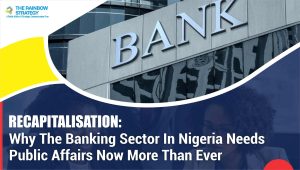Public affairs professionals are tasked with one of the most intricate challenges in corporate Nigeria: balancing the interests of private organisations with the often-mercurial policies, regulations, and socio-political dynamics of the country. In recent discussions held at the sidelines of national economic dialogue by a prominent think tank, corporate affairs and communications directors dissected current threats facing the public affairs profession, offering insight into the pressing risks that professionals must address.
This week, we’ll unpack some of the most critical risks and explore potential strategies for navigating this complex landscape.
- Policy Inconsistency and Regulatory Instability
Nigeria’s regulatory landscape is perpetually changing, often shaped by short-term political imperatives rather than long-term economic stability. Policy reversals and sudden changes, particularly in sectors like energy, manufacturing, and finance, present significant risks for public affairs professionals guiding organisations through compliance and strategic alignment.
Implications for Public Affairs Pros
Unpredictable policies can derail long-term strategic planning, and public affairs teams often face the challenge of making rapid adjustments. Recent executive orders on customs duties, and trade tariffs, or changes in foreign exchange policies, for example, can abruptly impact the viability of multinationals and other businesses in Nigeria. Public affairs pros must be vigilant, develop adaptive strategies, and work closely with policy analysts to anticipate changes.
Navigational Strategy
Implementing scenario-based planning and developing crisis communication frameworks are key. Professionals should maintain relationships with regulators, policymakers, and advocacy groups to stay informed on legislative developments. It’s also essential to cultivate an advisory role internally, guiding senior management on potential policy risks and keeping contingency plans ready.
- Legislative Volatility and Legislative ‘Rascality’
The term “legislative rascality” has been coined to describe the often capricious and self-interested actions of some legislators, which can result in hasty decisions without regard for the long-term economic health of the nation. This is particularly evident when bills are passed with little stakeholder consultation or when lawmakers support populist policies to appease their constituencies rather than uphold broader economic stability.
Implications for Public Affairs Pros
Legislative volatility can be disruptive, especially for industries heavily reliant on policy consistency or regulatory stability. For example, recent debates on proposed amendments to the National Tobacco Control Act underscore how quickly legislative tides can turn against certain industries.
Navigational Strategy
Developing strong stakeholder engagement strategies that emphasize transparency and proactivity is critical. Engaging with civil society groups, industry coalitions, and policymakers can help shape a more informed and balanced legislative discourse. Additionally, aligning with local associations and influencers can offer a buffer against unexpected legislative shifts.
- Socio-Economic Pressure and Heightened Stakeholder Expectations
Nigeria’s socio-economic challenges—high inflation, rising unemployment, and increasing public discontent—are shaping the public’s expectations of business organisations. There is a growing demand for businesses to play a more active role in addressing societal issues, leading to greater scrutiny from stakeholders on business practices, especially those seen as having a direct impact on daily lives.
Implications for Public Affairs Pros
In a climate of socio-economic unrest, organisations that are perceived as detached from societal concerns risk backlash, protests, or even consumer boycotts. Stakeholders, particularly younger, more digitally connected demographics, expect transparency and corporate responsibility. Any perceived indifference or exploitative practice can quickly escalate into reputational damage.
Navigational Strategy
A robust corporate social responsibility (CSR) framework and active involvement in community upliftment projects can build goodwill. Public affairs teams should leverage digital channels to foster transparency, address public concerns, and highlight CSR efforts that benefit local communities. Proactively sharing impact metrics and community engagement reports can help to bridge the trust gap.
- Digital and Media Disruption
The shift towards digital media has empowered citizens to become real-time watchdogs over corporate actions, with social media enabling rapid information sharing. While this democratisation of information has its benefits, it also means that organisations are constantly under the microscope, with every misstep potentially going viral.
Implications for Public Affairs Pros
Digital disruption has amplified the risks of misinformation and viral backlash. Public affairs teams are tasked with managing an environment where perceptions can turn negative in a matter of hours. The lack of control over how information spreads makes it challenging to contain reputational damage once a narrative begins to form.
Navigational Strategy
Building a proactive digital monitoring team and investing in media training for corporate spokespersons can enhance preparedness. Swift, transparent responses to crises, accompanied by accurate information dissemination, are essential. Additionally, fostering alliances with credible media outlets and influencers can help shape narratives before they spiral out of control.
- Geopolitical and Economic Risks
Nigeria’s economy is deeply interconnected with global economic trends, and public affairs professionals must now navigate an increasingly complex web of geopolitical influences. From fluctuating oil prices to foreign exchange volatility and international trade tensions, external pressures can impact local operations, investor confidence, and, consequently, a company’s public perception.
Implications for Public Affairs Pros
Geopolitical risks can affect business continuity and financial stability. A sharp depreciation in the naira, for instance, impacts the affordability of imports, inflation, and consumer purchasing power, which could reflect negatively on businesses. Global shifts in trade policies also affect Nigeria’s trade relationships, particularly with key trading partners.
Navigational Strategy
Public affairs teams should adopt a global perspective, staying abreast of international economic trends and adjusting strategies to mitigate risk. Building relationships with economic think tanks and financial analysts to inform business strategy can help organisations remain resilient in the face of external pressures. Additionally, crafting clear, optimistic communication for stakeholders can maintain trust during challenging periods.
- Security and Crisis Risks
Nigeria faces a range of security issues, from insurgency and banditry in the North to piracy in the Niger Delta. This security volatility can directly impact businesses, particularly in high-risk areas, with frequent disruptions in operations, supply chain uncertainties, and heightened risks for personnel.
Implications for Public Affairs Pros
Heightened security concerns necessitate comprehensive crisis management and contingency planning. In some cases, public affairs professionals may also have to navigate the social and reputational repercussions of operating in conflict zones, especially if communities feel marginalised or exploited.
Navigational Strategy
Developing strong security protocols and liaising closely with local communities is vital. A commitment to transparency, community engagement, and ethical business practices can build goodwill and foster a protective buffer against reputational risks in volatile areas.
Conclusion

The risks facing public affairs professionals in Nigeria are multifaceted, and the stakes are high. As the country’s political, economic, and social dynamics evolve, the public affairs profession must continually adapt to new challenges. Those who can stay ahead of policy changes, manage legislative volatility, harness the power of digital media, and proactively address socio-economic issues will find themselves well-positioned to steer their organisations safely through the turbulent waters of Nigeria’s public affairs landscape.








